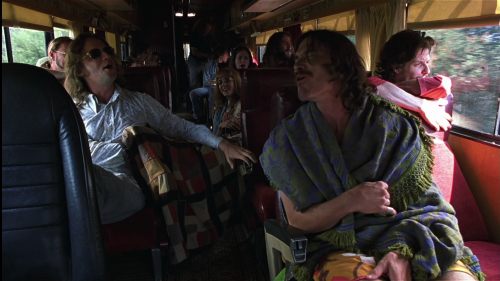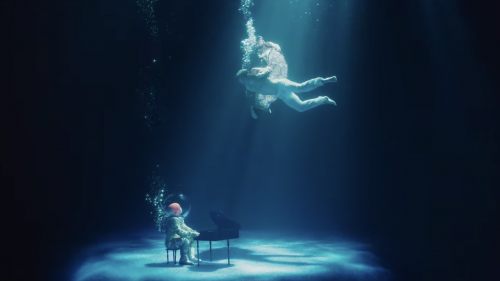ROCKETMAN Review: Burning Out His Fuse Up There Alone
Like dozens of the iconic performers whose hedonistic lives Hollywood has condensed into tidy redemption narratives, Elton John is virtually synonymous with rock & roll hedonism - as well as career endurance - making his life story a natural fit for the subgenre’s now deeply familiar structures. (Walk Hard fans had hoped that Jake Kasdan might be their Khaleesi, breaking the wheel of music biopic clichés, but Bohemian Rhapsody’s success only reaffirmed their efficacy.) Dexter Fletcher’s Rocketman aims slightly more to be a “musical biopic” where characters break out in song rather than a strict biography in which music is performed a la Walk the Line or Ray, but those are the only shades of gray in an effective but by-the-numbers retelling of the rise, fall and rebirth of the troubled, iconic pianist.
Taron Egerton plays John, a prodigiously talented musician whose talent blossoms after meeting songwriter Bernie Taupin (Jamie Bell). Together, they produce a number of hits, but the pressures of fame mount after they perform at the Troubadour in Los Angeles, catapulting Elton into the spotlight without the personal or professional safety net he needs. When Elton’s lover John Reid (Richard Madden) assumes the position of his manager, the performer finally finds a semblance of stability, and fueled by drugs and alcohol settles uneasily into a routine of appearances, performances and nonstop recording sessions. But Elton’s extravagant lifestyle - and the pressure of being in the public eye - soon catches up with him, propelling him into a destructive cycle of substance abuse, not just jeopardizing his career but alienating him from the people he cares about most - and the people who care about him.
Given not just the many permutations of his career but the possibilities of the genre, there were plenty of ways to tell the story of Elton John’s life - which is why it comes as a disappointment that the framing device for that story is a group rehab meeting where he recalls events from his past as nameless extras sit in a circle around him. Convincing behind the piano and charismatic as the singer he portrays, Egerton is quite frankly phenomenal as John, but even he can’t elevate these “therapy sessions” to anything of real substance, and these scenes ultimately do a modest disservice to the actual work that John and millions of other people do every day to maintain their sobriety and reclaim their lives. That said, I suspect there are few viewers buying tickets for Rocketman expecting to see the hard and unglamorous work of self-examination involved in true rehabilitation, so maybe it’s for the best that it largely functions as a clothesline for performances of the singer’s many hits.
At the helm of his own ship after inheriting Bryan Singer’s on Bohemian Rhaosody, Fletcher seems more confident and adventurous on Rocketman, but he lacks an inventiveness or courage to veer away from oftentimes literal interpretations of iconic lyrical moments. (I mean, a performance of “Saturday Night’s Alright (For Fighting)” doesn’t have to be set in a rowdy pub where fights break out, you know?) In one scene, Elton wanders through a SoCal party where Bernie Taupin has snuck off to enjoy the spoils of their victorious first performance at the Troubadour; singing “Tiny Dancer,” Elton showcases the impressive design and depth of the set, but Fletcher communicates almost none of the alienation and loneliness that he’s supposed to be feeling. Thankfully, Egerton’s performance in many of these moment carries them past the limitations of their staging, as during the climax of “Saturday Night’s Alright” which heralds the character’s transition into young adulthood, and the young actor practically explodes with impatient, febrile energy.
Even given the burdensome responsibility of rehashing a list of clichés the size of Elton John’s songbook (from first-night jitters to superstar preening to best friend rebuffing to a rock bottom pool belly flop), Egerton carries the movie as ably as Elton John commanded audiences worldwide, and looks like a natural in even the singer’s most absurdly over-the-top outfits. As Taupin, Bell offers a suitably understated counterpoint to Egerton’s flamboyance, underlining the talent and especially the magnanimity of Elton’s longtime creative partner, one of the few people (according to the movie) who offered him the unconditional love he thought was always out of reach. Meanwhile, Richard Madden plays his former lover and longtime manager John Reid with a smoldering sexuality that border on sociopathic, and Steven Mackintosh and Bryce Dallas Howard portray Elton’s inattentive parents with a cruelty exactly calculating enough to drive him first to success and later self-destruction.
At two hours, the film probably could have used a little less rock star backsliding - after an hour of him drinking to excess, you become desperate for him to hit rock bottom - and more of the songs that made him a fixture of popular music for more than four decades. Don’t get me wrong - “I’m Still Standing” is a perfectly appropriate finale for Elton’s journey of independence, self-actualization and atonement, not to mention a great earworm to exit the theater humming. But even if the film ignores chronology to pepper in songs from later in his career, John’s journey effectively ends in the mid-1980s, leaving virtually all of his subsequent achievements, collaborations and charitable work as a footnote over the closing credits.
Ultimately, Fletcher’s film offers a greatest hits survey of Elton John’s life and times, and there’s nothing wrong with that; it’s energetic, briskly staged and exceptionally well-acted. But like with so many musical biopics, Rocketman feels slightly like a missed opportunity to dig a little deeper into the life and humanity of a person who has earned his place in the pop cultural firmament. Especially for an artist who has provided the soundtrack to so many people’s lives, it seems unfair that we don’t learn any more about what made it the soundtrack to his as well.



